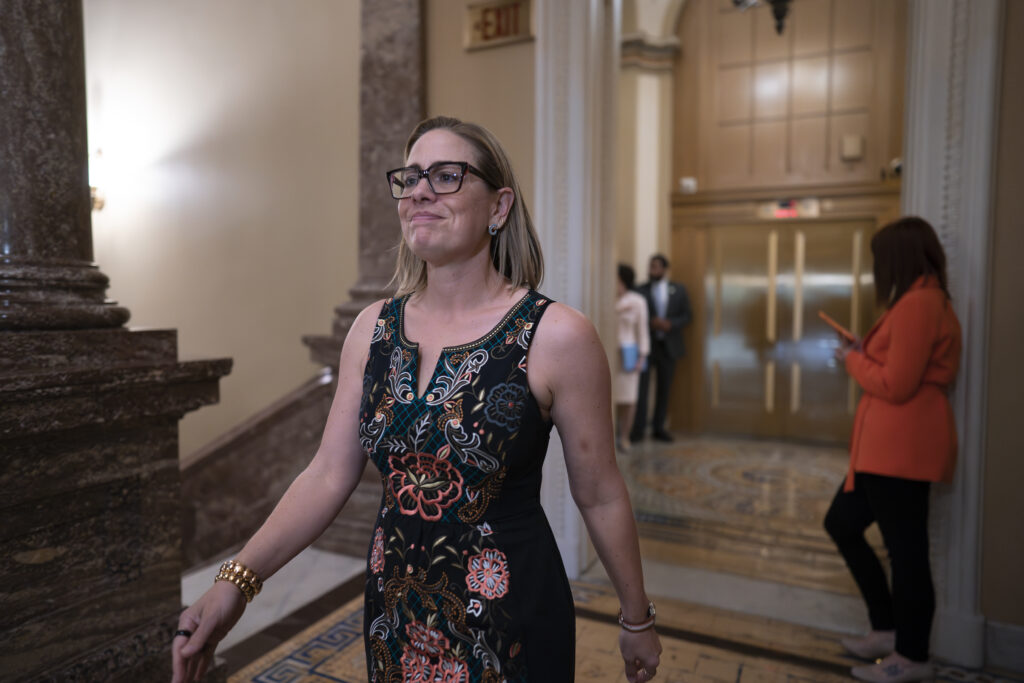Sen. Kyrsten Sinema (I-AZ) has been a bad fit in the Congress of today because her vices are the opposite of the dominant vices on Capitol Hill.
Sinema — who was drummed from the Democratic Party last year, and apparently felt drummed out of the Senate this year — was a woman of the recent past. She fit in the Bush and early Obama years when K Street lobbyists and lawmakers worked together smoothly to increase government, subsidize and protect big business, and enrich all the insiders, including the members and staffers who all cash out to K Street.
But the Tea Party and the Trumpian revolution of the 2010s largely broke that corrupt model and replaced it with a dysfunctional model. Congress largely stopped making laws because leadership saw its job as avoiding difficult votes, and the backbenchers had every incentive to stay as bomb-throwing, nay-voting backbenchers.

Sinema has a virtue that cut against Capitol Hill’s dominant vice: she wanted to make deals and actually make laws.
But this virtue was tied to her personal vice: she was a creature of K Street and a player in the corrupt game of crony capitalism and insider enrichment.
Sinema’s ideology, priorities, and demands have always been famously difficult to discern, in a way reminiscent of Aaron Burr, as portrayed by Ron Chernow and Lin-Manuel Miranda in the book and musical Hamilton.
Reporter McKay Coppins asked her “if there’s any ideological through line at all that explains the various votes she’s taken in the Senate. She thinks about it before answering, ‘No.’”
Her critics attacked her as an intellectual lightweight, but that’s not fair, or enlightening. It’s better to understand her style as strategic ambiguity. “I’m not that interested in telling people what I think.”
As Burr’s character puts it in the musical, “Talk less. Smile more. Don’t let them know what you’re against or what you’re for.”
As CNN put it wryly, Sinema stands up for her convictions, but they added, “send us an email if you can figure out what her convictions are. Nobody else can figure it out and she’s not telling.”
Their example: Democrats in 2021 pushed a bill to allow Medicare to negotiate lower drug prices, CNN reported “Sinema backs the pharmaceutical industry on this one. Why? It’s not entirely clear.”
The chief House champion of the pharmaceutical industry had plenty of drugmakers in his district. Sinema did not.
But follow her record closely and her viewpoint isn’t that confusing. In both the House and the Senate, Sinema was the leading Democrat in the fight to reauthorize the Export-Import Bank, a federal agency that exists to subsidize exports — mostly Boeing jets. The other leading champions of Ex-Im represented Boeing. Arizona, in contrast, relies less on exports than does the median state.
In the House, Sinema opposed the Tax Cuts and Jobs Act in 2017 on nearly unique grounds. She critiqued the bill for “eliminating … pro-business deductions,” and then mentioned the mortgage interest deduction twice. The TCJA of course never eliminated the mortgage interest deduction: it capped the amount of interest one could deduct — only the interest on the first $750,000 worth of mortgage. This change only affected a tiny sliver of Arizonans.
Recall, though, that Sinema didn’t describe the mortgage interest deduction as a deduction for families, but as a “pro-business deduction.” Mortgage bankers and the realtors are the real beneficiaries of the deduction, and from their perspective, the deduction really was being eliminated for millions of families. That’s because by doubling the standard deduction, the TCJA made that deduction moot for an overwhelming majority of homeowners.
Sinema opposed a tax cut for her constituents because it dried up a gravy train for industry.
Her belief system wasn’t about higher taxes or lower taxes. It wasn’t about more government or less. Sinema’s policymaking was consistently about intertwining government and industry, through subsidies, regulations, and tax complexity. This dovetailed nicely with her constant coyness: If everything’s on the table, then the lobbyists need to keep coming to the table.
Bringing industry and lobbyists to the table was her central motivating principle.
That’s why Democrats recruited her to run for Senate in 2018: “she’s good at raising money,” the Washington Post reported upon her announcement.
CLICK HERE TO READ MORE FROM THE WASHINGTON EXAMINER
Her deal-making, a virtue in these days when oppositional obstinacy is the rule, was inextricable from her cronyism.
It will be the least surprising thing in the world if Sinema is a lobbyist at this time next year. The only question is whether she will be able to deliver for her corporate clients in a Congress that doesn’t pass anything.
